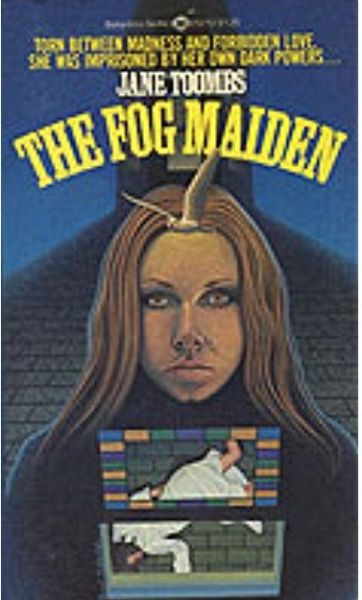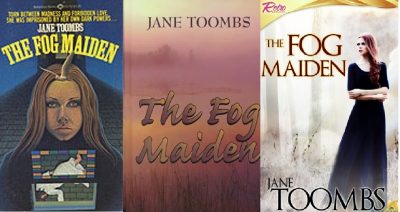Cry, Little Sister
The Fog Maiden
By Jane Toombs

20 Jan, 2019
Jane Toombs’ 1976 The Fog Maiden is a standalone fantasy novel. If it were published today, I suspect it would be classified as urban fantasy/paranormal romance.
After the death of her father, Janella Maki was raised by her well-meaning but distant stepmother. Janella has no memories of her early past and knows even less about her biological parents. It’s a surprise when an uncle shows up to renew family ties.
The new uncle, Lucien DuBois, is not a blood relative. His wife Toivi, he says, is Janella’s father’s sister. Brother and sister had lost contact with each other and Lucien has only now found the missing branch of his wife’s family.
Lucien offers the unemployed Janella a job: she can help care for her invalid aunt Toivi. Janella isn’t entirely sure she likes this idea but lacking other options, off to Lucien and Toivi’s isolated home she goes.
The household also includes a disagreeable housekeeper and a odd old woman named Akki, who is prone to prophecy. Oddnesses multiply. Janella finds herself recovering disturbing snatches of memory from her early childhood. A mysterious red-haired man is seen lurking on the grounds, Toivi claims to be a Finnish witch. The housekeeper provides the coup de grace: Janella is not the first attractive young woman to move into the DuBois house. Her predecessor Chris vanished.
If Janella had been reading any of the Gothic romances of the period, she would have known that it was time to leave. In her nightgown, across the moors, leaving the brooding mansion behind her.

Janella stays.
That’s when the deaths start.
~oOo~
There’s an extremely disabled person in this story. Don’t expect a modern treatment of the character.
When I wrote my Women of the 1970s pieces for Tor Dot Com, I was sure I’d never read Toombs. Not so! I found a copy of this book and discovered that the cover seemed all too familiar. The book is definitely a fantasy, but based on cover and plot, might have been more at home over in the romance section. I could be wrong: it’s never had a particularly Gothicky cover.

Janella is all too passive; she’s a natural victim. The clues that something is terribly wrong start to add up. Yet even after Lucien kisses her, she stays. She becomes alarmed only when the body count starts to rise (something that also bothers the local coroner).
If this were a modern paranormal romance/urban fantasy, Janella would no doubt have embraced her [spoiler] magical heritage. Janella isn’t interested in doing this. Perhaps she’s just being passive1 but one could also argue that this is simple prudence. Magic has caused the deaths of at least four people and drives at least one person quite mad. The one character who is both magically adept and still sane isn’t happy; she can see her death coming. There’s nothing in this book that would argue that dabbling in the dark arts is either useful or beneficial.
The front-and-center villain is Toivi, keen on commanding dark magic (also, she likes filthy paintings; this isn’t one of those novels where nice girls like sex). But Toivi’s ability to do harm is due to Lucien’s efforts; he recruits victims and he lies for her. Lucien gaslights pretty much everyone around him. He’s convinced he’s doing this for the good of his dupes. Later regrets don’t make up for the tragic consequences of his actions. Too bad that the author seems to give him a pass for his duplicity.
Not only does she give him a pass, she intimates that Lucien and Janella will be a thing. The earnest but hunky enabler will be rewarded with his infatuated niece. As is the wont of Gothic romances. Sigh. At least it’s not just Heinlein.
The Fog Maiden is out of print.
1: Janella’s father magically erased her memories of the time before her mother’s death. He did this for her own good, or so he thought. I wondered if this meddling had something to do with her curious passivity. Or perhaps she was just enacting mid-twentieth century gender roles.
